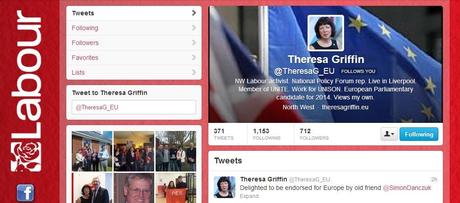Social Media is a growing concern for anyone in politics or business. It’s grown hugely in the past few years, with Facebook leading the field and trailing somewhat (but still very important) Twitter and Google+.

In this post I want to share my 10 easy social media tips for politicians, local and national. Some of these are warnings and some really handy tips, either way take them – share them and grow your social media profile.
Social Media Tips for Politicians
1) Commit Yourself to Social Media
There is nothing quite as bad as someone doing bits on Social Media but not committing to using it for all it’s worth. Be honest with yourself and your team, if you don’t have enough time to really take control of your social media presence across the board focus on just one network, usually Facebook or Twitter. By focusing on one platform, you can more easily commit to it the social network and your followers on there. Commitment to a platform will mean more engagement, in general.
If you don’t have enough time to constantly update your Twitter or Facebook it’s not the end of the world. Read on to “plan your social media campaign”.
2) Get Personal
To grow engagement with your network and grow follower numbers follow these tips:
- Complete your social network profile.
- Use a recent photo, a close up of your head and shoulders is best.
- Ensure your contact info is correct.
- Clearly show which party you support, if you can.
A great example of these in use is if you think about Twitter profiles. You, like me and everyone else, are highly unlikely to follow someone with a default picture of an egg – it shows that the person a) has no idea how to use twitter b) could be spammy and c) doesn’t care how the account represent them. Also if you make clear you are likely to talk politics, this means people won’t follow who are uninterested and will follow if they are interested or party members. Being transparent in using social media can make the difference between lots of followers and very few.
3) What Goes Around Comes Around
In the world of social media it is good to be nice. Remember that the world can see what you are doing, and they will judge if you are good or bad, naughty or nice – so be nice and it will usually be nice back! This means that you should like, share, tweet, retweet and +1 things your followers say, though of course use your judgment on this (i.e don’t retweet naked pictures or potentially malicious rumours).
4) Get Talking
Social Media is about conversations, it is not about broadcasting your message. So expect conversations, expect the people to disagree with things you say (but don’t take an angry tone in replying), expect that people you may not know and who may not even be in your constituency to take an interest. Social Media is global, so the conversation is too. Interact and Engage with the conversations of social media and you will be rewarded.
5) Plan Your Social Media Campaign
If you are a “headless chicken” talking at 101 events and have little time to interact with social media … plan ahead.
There are some great tools to help you with this, for example you can now schedule posts directly on facebook, you can also use services like twuffer to schedule posts for twitter. If you need something a little more advanced, maybe you want to post to multiple networks all from one nice place (and give your team access) then give HootSuite or PostCron a try, these have free services but for maximum effect I advise going for a paid plan.
Scheduling updates to tell your audience where you are talking next, where you are talking in a given week or maybe even when ballot papers are being sent out can really help your campaign and build your audience. It makes you appear active (even though you may not be) and it means your audience is more likely to show up to support you at events such as hustings.
6) Public Life Vs Private Life
All politicians have a public and private life, but online you need to be careful as the distinction is often very blurry – especially if you have social media before your life becomes more public. You need to think twice when you post an update about your friends or family, or even your own health, you need to consider the views of those your are talking about and whether they would be happy for you to say or post something (just as you should do on your personal profiles). But as a public figure you really need to consider everything, should you post a picture of you on a beach, should you post a picture of your family who don’t live a public life – just consider all outcomes and only post what you are certain about.
Remember: if you post something online it can’t be deleted, you may hit delete but someone may have it archived or a screenshot of it – you may get lucky but don’t take the chance.
7) Connect Offline and Online Worlds
Online media, in general, is cheaper to use and organize than the offline media of print. Imagine if you could reach all of your constituents by email or twitter or facebook, there would not be need to print leaflets or post letters – the cost hugely decreases online. Print will never end in politics, but you can help reduce it’s need and your cost (and save the forests at the same time). In addition to this if you can get your constituents online following you they are more likely to talk to you and be aware of events you are doing – it’s a win win situation.
So on your print material put your facebook and twitter information – and of course your website.
8) Be Ready To Take Control
No body wants to be involved in damage control, but online you need to be ready maybe more so than offline. For instance if you say something which someone else disagrees with (usually it being politics, it will) you need to be ready to calmly take control of the conversation – do not beat them down saying they are wrong, respect their views and explain your side. Try to keep positive, never shout.
If you have built a good online presence over a good period of time, your audience will know your are transparent and responsive – this means you are best placed to take control, and should be able to do so with ease. If you have only just joined a network or simply spout off all your views at once forcing them on people, well you won’t get too far and it won’t just be one person attacking you for them disagreeing but also maybe others on the network for you not having good netiquette.
9) Start Early
Seriously, if you are reading this you may already be on social media (I bet you are), but if you aren’t and/or you know a candidate or politician not on social media then please pass this article on. All candidates should be on social media right now, if they aren’t they won’t reach their potential nor maximum audience and support. That could be valued support and votes, it could also be even more because those supporters will likely share your updates and pictures which extends your reach further and so you campaign goes beyond the physical abilities you have and becomes present across your constituency (assuming you’ve grown followers in that area). If you are standing for election in May 2014 for example you should start now (may 2013), if you don’t you won’t have a great coverage when it comes to election time and you wont be able to during that final week make a big push online which you could if you start today.
10) Enjoy Yourself
I may have set out some rules above, but at the end of the day enjoy yourself with social media. People want to know you are an authentic person and don’t want to constantly hear your policies (apart from maybe in the final campaign run up to election), they want to talk to you the person and not you the party or organisation. So be yourself, have a little fun and don’t be scared to talk to people. Social Media is a great tool, use it.
Who is the best and why?
We would like to know who you think is the best politican or candidate is on social media and why. Let us know by leaving a comment below.
—
With thanks to @theresag_eu (Theresa Griffin) for use of the picture above, please do all follow her, and visit her website.
Original Content by SEO Andy @ 10 Quick Social Media Tips for Politicians

